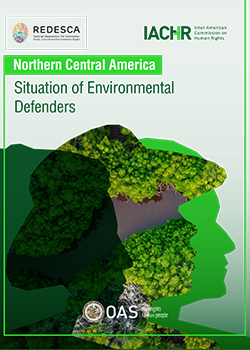
Press Release
IACHR Publishes Report on Situation of Environmental Defenders in Northern Central American Countries
April 25, 2023
Contact info
IACHR Press Office
Distribution List
Washington, D.C.—Today, the Inter-American Commission on Human Rights (IACHR) released the Report on the Situation of Environmental Human Rights Defenders in the Northern Central American Countries, which analyzes the human rights situation in which defenders go about their work defending land, territory, and the environment in Guatemala, Honduras, and El Salvador. This report was drafted under the auspices of the 2023–2027 Strategic Plan.
Northern Central America is currently considered one of the most dangerous regions in the Americas and the world for those defending land, territory, and the environment. The report finds that a significant number of the acts of violence that have taken place against defenders in recent years have occurred in the vicinity of megaprojects and areas in which there is exploitation of natural resources in connection with mining, hydroelectric power or energy projects, agriculture, excessive and/or illegal logging, and tourism or real-estate development.
The IACHR has found that some groups of people involved in the defense of the environment, land, and territory are exposed to greater risk than others, such as women and people of indigenous or African descent. The vulnerability experienced by these groups as they go about their work defending the environment are compounded by structural factors such as ethnic and racial discrimination and the levels of marginalization, poverty, inequality, and social exclusion that have historically jeopardized them.
The acts of violence in question include stigmatizing discourse, harassment and threats, physical attacks, murders, and forced disappearances. Over at least the last five years, there have been an alarming number of murders of environmental defenders in Honduras and Guatemala. Likewise, the criminalization of this defense work through the inappropriate use of criminal law has been on the rise in recent years and has become common practice in northern Central America.
The IACHR is concerned about the lack of official statistics and a detailed, disaggregated, unified registry of these attacks. At the same time, the report identifies serious obstacles to progress on investigations into crimes committed against these groups, reflecting a context of impunity.
The report expands on the obligations of States and the standards that the inter-American system establishes in relation to environmental defenders in northern Central America. It also analyzes the institutional response to the violence experienced by these groups, namely the prevention, protection, and investigation measures that have been implemented in El Salvador, Guatemala, and Honduras. Finally, it puts forward a series of recommendations for States to strengthen their efforts to protect and guarantee the rights of defenders of human rights, the environment, land, and territory.
Defenders of the environment, land, and territory play a fundamental role in developing environmental protection policies and strategies to achieve sustainable development. As a result, acts of violence against these groups not only jeopardize their rights as individuals but also undermine the role they play within the societies of the States of northern Central American and the international community.
The IACHR called on the States of El Salvador, Guatemala, and Honduras to foster an environment free of human rights violations that exercises full respect for fundamental freedoms, as these are indispensable conditions for those who defend human rights to be able to go about their work freely, including that of defending land, territory, and the environment. The IACHR once again expressed its willingness to provide technical assistance in this field.
A principal, autonomous body of the Organization of American States (OAS), the IACHR derives its mandate from the OAS Charter and the American Convention on Human Rights. The Inter-American Commission has a mandate to promote respect for and to defend human rights in the region and acts as a consultative body to the OAS in this area. The Commission is composed of seven independent members who are elected in an individual capacity by the OAS General Assembly and who do not represent their countries of origin or residence.
No. 076/23
6:49:39 PM


